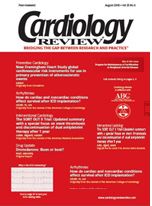Statin therapy in heart failure
I read with interest the article by Horwich and Fonarow1 and the accompanying commentary by Borzak (October 2004).2 Most studies extol the benefits of HMG-CoA reductase inhibitors (statins) in the treatment of coronary disease and other atherosclerotic vessels with objective evidence of plasma cholesterol/low-density lipoprotein (LDL) reduction, but none have shown any concomitant effect on the plasma level of coenzyme Q10 (CoQ10). I agree that retrospective studies are limited and that more effective medical regimens and new devices are available, which have proven to have a positive impact on heart failure (HF) outcome.
Cholesterol is a steroid. It is synthesized in the liver, intestines, skin, adrenal cortex, testes, and aorta. These alone should give us pause, especially when the National Cholesterol Education Program is recommending aggressive reduction of LDL. To refresh our memory, the first stage in the biosynthesis of cholesterol is the formation of mevalonate from acetyl CoA catalyzed by HMG-CoA reductase (site of statin inhibition). The second stage is the formation of isoprenoid units from mevalonate, which are the building blocks of the “steroid skeleton.” The condensation of these units, the third stage, will eventually lead to cholesterol. However, the isoprenoid unit is also the side chain of CoQ10.1-3
CoQ10 plays a vital role in the mitochondrial respiratory chain with electron and proton transfer during adenosine triphosphate (ATP) generation. It also acts as an antioxidant and stabilizes membrane function.4 Cells with a large ATP requirement tend to have more mitochondria. Heavily utilized muscles, such as cardiac and skeletal muscles, have cells containing large numbers of mitochondria adjacent to the contractile elements. Proper myocardial function then is ATP dependent.5 A decreased CoQ10 will have an adverse effect in energy generation and may have a role in the pathogenesis of HF when a statin is used.6,7 Another study has shown left ventricular diastolic function with Doppler echocardiography before and after statin treatment with worsening after and reversal with CoQ10 supplementation.8 The mortality rate is increased in patients with low cholesterol and advanced HF.9 It is possible that the low cholesterol reflects a declining CoQ10.
We need prospective clinical trials in order to better assess the long-term effect of statins on cardiac function before an epidemic of HF follows aggressive lipid-lowering therapy. Thank you.
Eulogio H. Rectra, Jr, MD
Watertown, New York
Response:
We appreciate the interest of Dr. Rectra in our study of statin therapy in HF1 and agree that randomized controlled trials are needed before statins can definitively be recommended as a therapy for HF. Several large trials of statin therapy in HF are currently under way.
The abundance of scientific and clinical data on statin therapy does not support Dr. Rectra’s concern that statin therapy may produce an “epidemic of HF.” Reduction of coenzyme Q10 levels, in theory, could adversely affect cardiac function and exercise tolerance in HF, and this deserves further study. However, there are also multiple biologic mechanisms by which statins could improve symptoms and survival in HF. In addition to anti-ischemic
actions, statins may decrease sympathetic activation, improve endothelial function, and decrease inflammatory cytokine activity.2 In animal models of HF, as well as small trials in humans with HF, statin therapy has been shown to reverse pathologic myocardial remodeling and improve systolic function.3
Confirming our initial findings, other investigators have now also observed improved survival in HF patients treated with statins.4,5 Despite the association between low cho-
lesterol and increased HF mortality, the association between statins and improved survival in HF appears to be independent of baseline cholesterol levels.1 Large randomized stat-in trials in coronary artery disease have shown that statins reduce the incidence of HF and improve survi-val in those with asymptomatic left ventricular dysfunction.6,7 Taken to-gether, these data suggest that statin therapy at least is safe for patients with HF.
Ischemic events increase the risk of HF hospitalization and mortality; autopsy studies have revealed that acute coronary syndromes may be a more frequent cause of death than previously realized in both ischemic and nonischemic HF.8 In light of the well-established cardiovascular protective properties of statins and the current state of evidence on statins and HF, statin therapy in ischemic HF should be strongly considered, as we await the more definitive answers from randomized trials.
Tamara B. Horwich, MD Gregg C. Fonarow, MD Ahmanson UCLA Cardiomyopathy Center, David Geffen School of Medicine at UCLA Los Angeles, California
